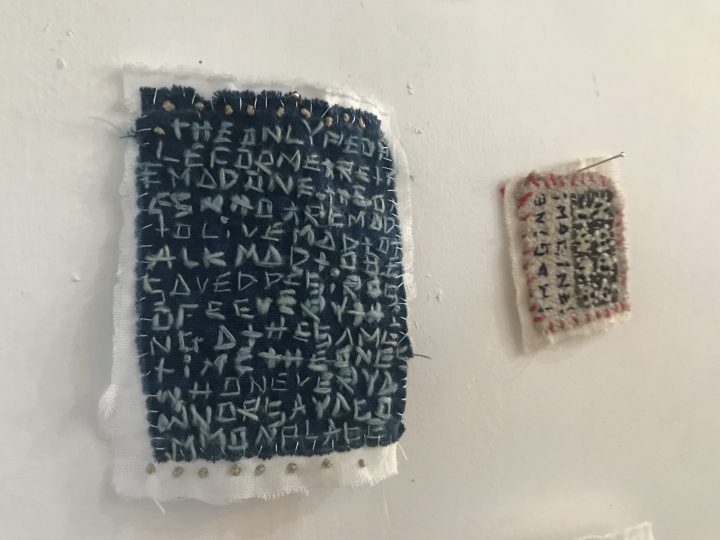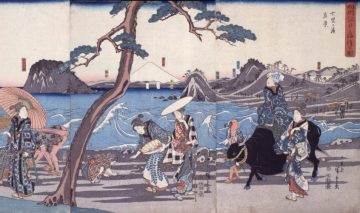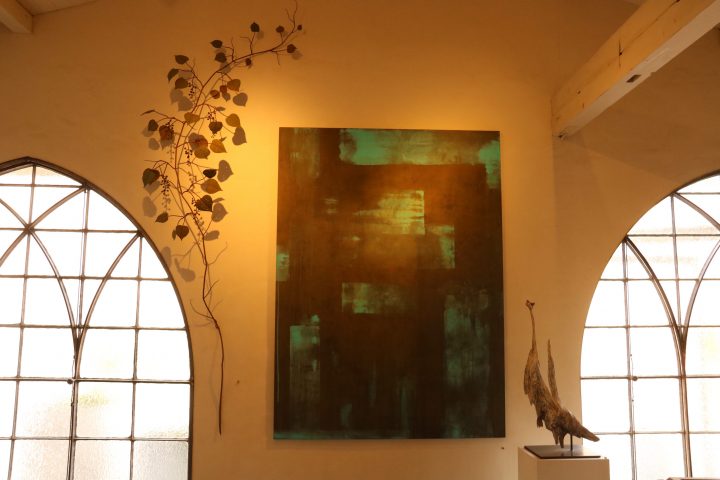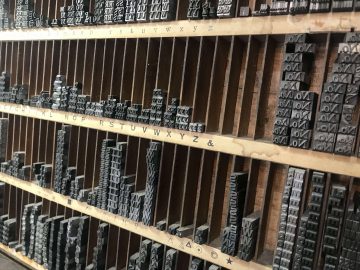Kanagawa・Standing Drinking Culture Talk Vol.3 "Strolling and Blues"
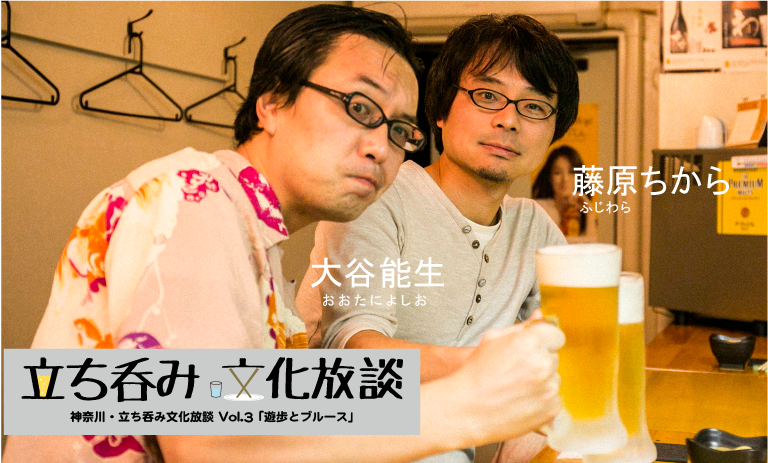
2014.11.11 Text: Akiko Inoue Photo: Masamasa Nishino
Chikara FUJIWARA
Editor, critic, and freelancer. Founder of BricolaQ. Born in Kochi City in 1977. Moved to Tokyo alone at the age of 12 and started living there. Moved around a lot after that, worked for a publishing company before going freelance. Edited magazines such as Ex-Po, Musashino Art University's newsletter mauleaf, and Setagaya Public Theater's CaroMag. Co-edited and co-authored with Tsujimoto Chikara "Book Guide as Architecture" (Meigetsudo Shoten). Co-authored with Tokunaga Kyoko "The Strongest Engeki Theory" (Asuka Shinsha). Currently lives in Yokohama. Involved in the launch of Theater Center F.
Yoshio OHTANI
Critic and musician born in 1972. From 1996 to 2002, he edited and wrote for the music review magazine "Espresso". Since then, he has been actively writing, such as co-authoring "The School That Taught Melancholy and Sensuality" with Naruyoshi Kikuchi, and publishing "Poor Music" and "Distracted Strolls in the Prose World: Reading 20th Century Criticism" as solo works. He is also active as a musician, participating in many groups such as sim and mas. He has released solo albums "From "Kashi-Boki-Sho"" and "Ongaku for the Stage 2" from HEADZ and "Jazz Abstractions" from BlackSmoker. He composed the music for the film "Ranbou to Taitei" (Battle and Waiting), and also wrote the theme song under the name "Sotasei-Roryon to Yoshio Otani". He has performed in various sessions, including theater and contemporary dance performances.
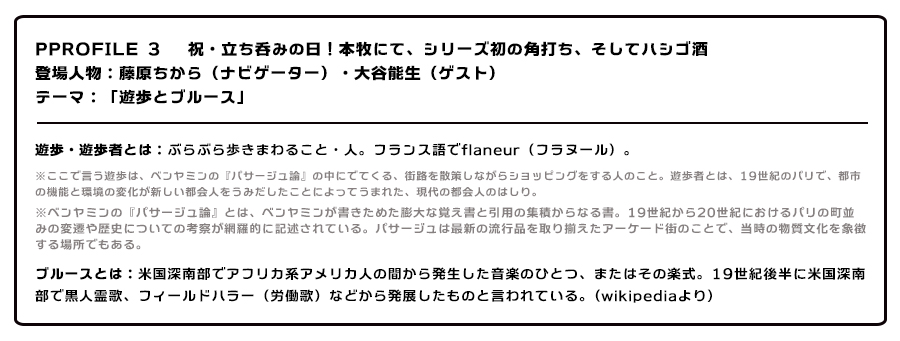

Yuriko (Suzukiya owner): Yes, this is the one Paul gave me.

At Suzukiya Liquor Store, snacks provided by regular customer Paul are always available and served to customers free of charge.
Fujiwara: Wow! Thank you very much.
Otani: What's this? Margarine...?
Yuriko: Cheese.
Before we get to the main topic, let's start with some small talk...
Fujiwara: First, let's go to a bar for a drink to cheer us up...!
Kakuuchi is a place for locals to relax, so it's not something you would normally go in with a bang, but this time I took advantage of Suzukiya's generosity and dropped in.
Actually, a few years ago Otani-san took me to Asamiya in Yokohamabashi, which was the first kakuuchi I went to within Kanagawa Prefecture, and there are still quite a few kakuuchi left in places like Yokohama and Yokosuka.
Otani: Yokohama is quite large. There are still many liquor stores operating there.
Fujiwara: This time, Otani and I are participating in the Honmoku Art Project 2014 , so we chose Honmoku as the setting.
Honmoku is a town located south of Motomachi, beyond the Mugita Tunnel (Yamate Tunnel), and there is no train service. The main means of transportation is the bus. The town was occupied by the US military until 1982. The land was returned and Maikaru Honmoku was built... The main venue for this art project is the old movie theater that used to be in Maikaru. I heard that Otani-san used to go there too.
Otani: Yes.
Fujiwara: That story was written in the tabloid edition of the newspaper, "Honmoku Times," so I'll leave you to read that.
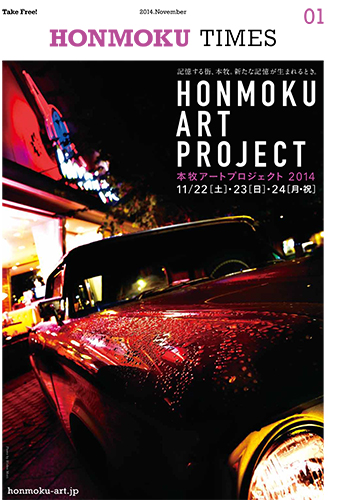
"Honmoku Times" published by Honmoku Art Project *Click here for the first issue
Fujiwara: The first time I became aware of Honmoku was... Do you remember...? When Otani-san directed Yasunari Kawabata's "Sounds of the Mountain" in Roppongi, he gave me a ride back to Yokohama.
Otani: I see. We carried tatami mats and other things then.
Fujiwara: So when we got to Sakuragicho, Otani muttered, "If you go straight down this road, you'll reach Honmoku." At the time, I knew so little that I could have easily read it as "Honmoku," but of course I had heard the sound "Honmoku" before, in songs, for example, by Crazy Ken Band. And then, for the first time, I thought, "Oh, so this is Honmoku..." and the image connected.
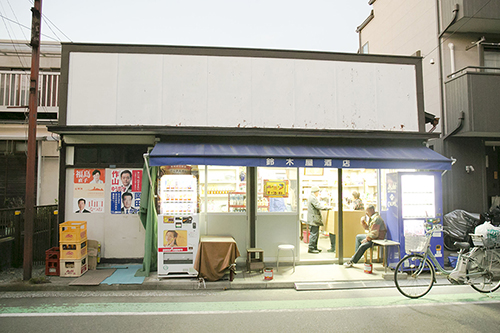
Around 4 o'clock, regular customers start to gather at Suzukiya. That day, they were all excited talking about the Showa era.
Regular Customer A: The last one was in 1987, right?
Otani: No, the emperor passed away in January 1989, so 64 will be the last. The last person born in the Showa era was around 26 years old. Around half of the world is now born in the Heisei era.
Yuriko: Are you from the Showa era?
Otani: It was the 1960s.
Fujiwara: For me it was the 50s.
Regular Customer B: Eh? It's the Showa era? Oh, I guess I'm not the only one who's old, mom (laughs).
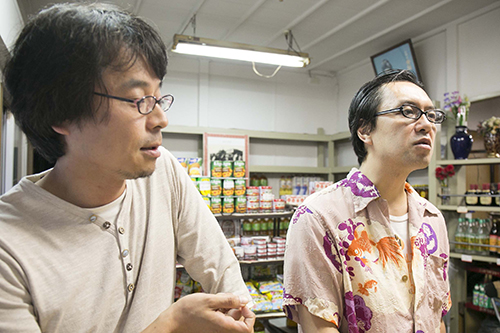
Otani: I've been thinking lately that if you use the image of the career you envisioned when you were a child as a ruler, if you subtract 10 years, like a 50-year-old now would be a 40-year-old, and a 40-year-old would be a 30-year-old, it will roughly match the image. Well, it's a rough estimate, though. It's the same for musicians, and nowadays many people start making their own music at around 30 years old, but 30 is about the age when The Beatles broke up.
Fujiwara: Ah, that may be true. I still can't believe that Bakabon's dad is 41 years old. So Otani-san has not only turned 40, but has also surpassed the age of being Bakabon's dad.
Oh, excuse me. I'd like to mix it with tomato juice and shochu.
Yuriko: Yes, 230 yen.
Fujiwara: Come to think of it, I've been reading the legend of King Arthur (※) every night recently.
*The Tale of King Arthur: One of the chivalric tales of medieval Europe. A fantasy filled with heroic tales and miracle tales based on myths and folklore, such as "The Knights of the Round Table," "The Quest for the Holy Grail," and "Tristan and Isolde." The Arthurian legend is best known for the compilation of stories that had been scattered up until that point, compiled by Thomas Malory in the 1400s.
Otani: Why?
Fujiwara: I found this research book among the books I bought on impulse at a used bookstore in Yamate out of desperation. I loved the story of King Arthur and the Knights of the Round Table when I was little, and the writing style of this research book is so chaotic and fascinating, and it feels like the author wrote it as it came to mind. The same story is repeated over and over again, so it feels like listening to your grandpa tell you a story.
In the book, there was a story that there was a time when the upper classes of England used to speak French. Is that a well-known fact? It may be because of my ignorance, but I thought, "Wow, that's surprising!" I mean, in the movie "My Fair Lady," Audrey Hepburn plays a tomboyish, poor girl who learns proper English, right? A dignified, traditional English.
Otani: Something like, "In Spain, rain mainly falls on the plains."
Fujiwara: Hmm? What was that?
Otani: The rain in Spain stays mainly in the plane.
Fujiwara: Ah, that's it. In other words, it's like "namamuginamagomenamatamago".
This reminds me of an episode related to Hepburn. I once worked as a cat sitter for the Otani family.
Otani: Yeah, I did ask him. I think it was when we were on tour somewhere.
Fujiwara: So, one night I snuck out of Otani's house and wandered down to Kogane-cho. The bar is no longer there, but there was a bar called Gonbei under the Keikyu line that also served ramen. There was a drunk old man at the counter who started using some awful slang that you can't say here. But the owner brushed it off, which I thought was amazing, and it seemed like she was a movie fan, and we ended up talking about Hepburn and had a great time. ...So that night I decided I'd move to this area.
Otani: Eh, why?
Fujiwara: I wonder why. How long have you lived in Yokohama, Otani-san?
Otani: About 20 years, I think. I left Hachinohe and at first I stayed at a few friends' houses in Tokyo.
Fujiwara: You've been in Yokohama ever since. Did you ever think about living in Tokyo?
Otani: I don't think so.
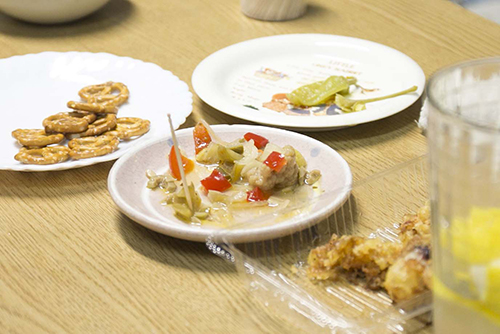
Yuriko brought out regular customer Paul's special pickles and jalapenos.
Fujiwara: Paul always brings lots of delicious food.
Paul: Mom, give me the little spoon! I want a pinch spoon.
Regular Customer A: Is this the first time you've eaten this?
Otani: Yes, it was my first time eating it.
Regular customer A: We eat it every week. That's why we're living so long (laughs).
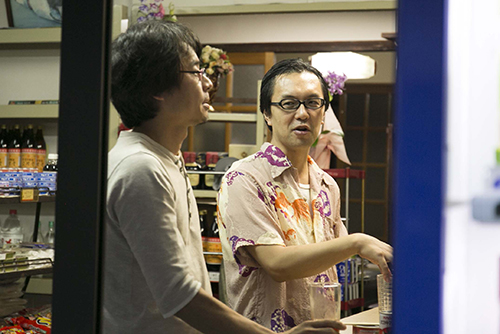
Around 5pm, many regulars gather and enjoy their own conversations.
Regular Customer B: It looks like another typhoon is coming.
Yuriko: That's terrible.
Regular Customer B: I'm getting sick of it.
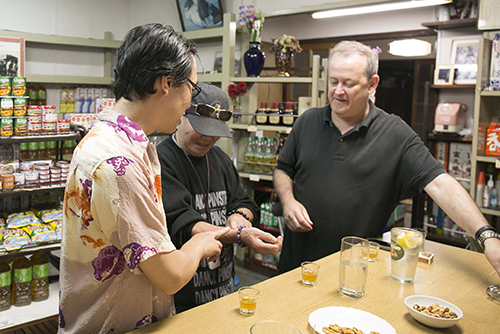
Otani: Paul, what time do you work until?
Paul: Around 2 o'clock. No overtime for office workers. Work is work.
Otani: Work is work. Isn't that overtime?
Yuriko: It's a small company.
Yuriko and Paul: (in unison) Yes.
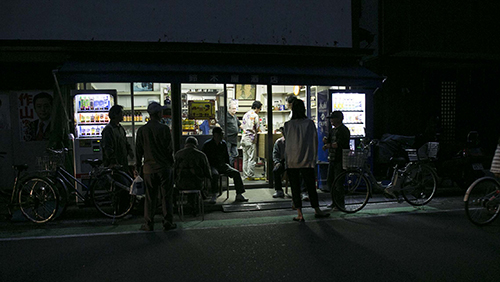
A regular customer outside: I come here every day to drink. Look around here on Google Earth, I'm in it.
Staff: What?! It's already your world debut?!
Amidst the pleasant conversation, we reluctantly headed to the second bar, Tachinomi Dokoro Yamashizu.
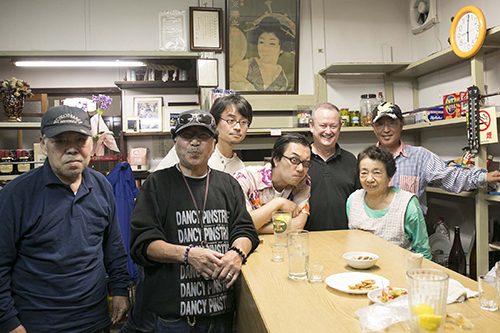
Before that, we took a commemorative photo with everyone at Suzukiya Liquor Store!
▶ Next, the second one
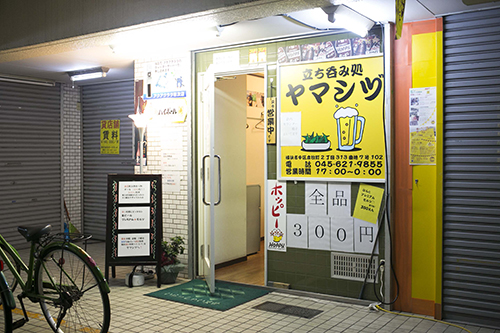
Although the sign at this restaurant says "standing bar," there are actually chairs available for seating. This hidden gem offers fresh ingredients sourced from nearby markets, Hayama, Hokkaido, and other places at amazing prices.
For now, let's toast with beer!
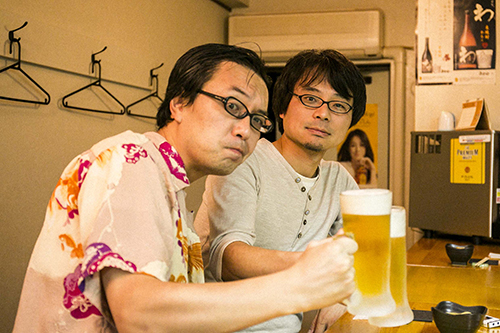
Master: How is it?
Otani and Fujiwara: Great!!!
Otani: How much is this?
Master: 300 yen.
Otani: Wow, 300 yen for this is crazy! (laughs)

At Yamashizu, all dishes and drinks are 300 yen!
Otani: Wow, this is really good... Amazing.
Staff: It's delicious, isn't it? The bubbles have to form.
We have been awarded the Meister title (※) by Suntory.
*This title is given only to Meisters who meet high standards among restaurants that serve Premium Malt's.
Fujiwara: Let's eat some meat. Apparently you can get fresh meat from the slaughterhouse at Daikoku Wharf.
Chef: In addition to the liver that is only available on Thursdays, we also have heart.
Otani: Can you eat raw liver?
Chef: Yes, it's good raw. (Note: It's pork liver.) (Note: This information is from November 2014.)
Fujiwara: Let's start with raw liver. I also recommend Hayama wakame seaweed.
Otani: I really want to eat octopus from Hayama.
Fujiwara: Then I'll have sashimi.
Master: Yes, let's start with raw liver. Try a bite.

The liver, available only on Thursdays, is sourced from a slaughterhouse at Daikoku Wharf!
Otani/Fujiwara: Wonderful.
Master: Sweet, right?
Otani: It has a nice texture. The blood tastes good...
Master: All items are 300 yen.
Otani: Eh? Maybe it's just too much hassle to change the price? I need to think about the cost price properly (laughs).
Fujiwara: By the way, the owner's son is apparently running a second store in Isezakicho.
Otani: Wow. It's close by, so I'll drop by.
Yoshio Otani
Fujiwara: What's mysterious about Mr. Otani is that although he is conscious of genres like "modern jazz," he never lives within a genre. It feels like he lives in a very macroscopic time.
Otani: That's because genres are outside of oneself. Whether it's theater, film, novels, music, or criticism, there is naturally a tension between oneself and the outside, and within that, I just want to create good things one by one.
I'm actually happy to have what I do categorized in various ways, and when people tell me "this is what it is," I feel like "Oh, I see."
Fujiwara: I can somewhat understand that feeling, but it may be rare in the real world.
Otani: The world is a tough place, so please just let it be! (laughs)
Fujiwara: Yes, I understand.
Otani: Oh, master, can I have some sake?
Master: The sake comes in a large flask, with the flavor Shochikubai.
Otani: Ah...but I think shochu would go better with it...
Master: The shochu we use are "wanko" (barley) and "nanko" (sweet potato).
Otani: No... but still... I'd like to make the hot sake a little hotter and serve it in a large sake bottle!
Master: Yes.
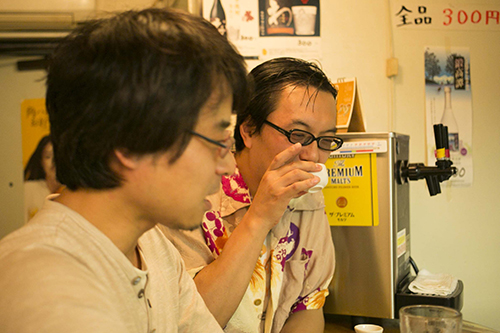
The emergence of the modern flâneur
Otani: Well, I guess it's time to move on to Benjamin. That's the theme for today, right?
Fujiwara: Let's do it!
Otani: Benjamin is a 20th century man, but in an era when we are concerned with how to unite the productive forces of nations and people, he wanted to rethink that. So what he did was to start by collecting a lot of customs from the 19th century capital of Paris (※1) . That was very important, and it increased the amount of information. By the way, up until then, information was, to put it extremely, songs. In other words, you learn it through songs. But in 19th century Paris, information was constantly coming in from other countries that you didn't know at all, and you had to react to it, so information became communication, that is, data... That's why he took up Baudelaire (※2) to talk about how to maintain a certain kind of humanity in that situation.
*1 This was a period when the world's wealth was concentrated in Europe, Europe's wealth in France, and France's wealth in Paris.
*2 In his essay "Discourses on Passages," Benjamin places great importance on Baudelaire as the person who best embodied the 19th century.
Fujiwara: I see. So that's where the attitude of a "flâneur" who drifts through information comes into play.
Otani: In other words, he is saying that "walking" is a modern thing. It's not easy to connect that with what we're talking about today.
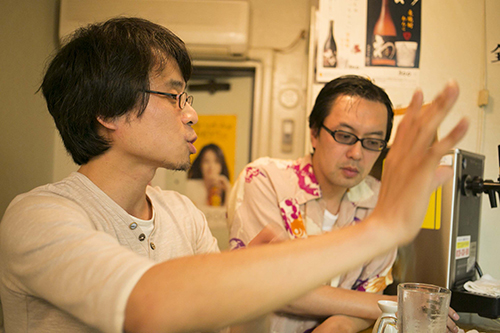
Fujiwara: Well, the tentative theme for today's chat is "Walking and the Blues," and I thought it was absurd to throw this at Otani Yoshio, in other words, it was like throwing a brush at Kobo Daishi. But I still decided to bring it up because I'm currently working on " Engeki Quest," a program participating in the "Honmoku Art Project 2014," and I'm walking around Honmoku for research. I've really been walking around, and I don't know how many one-day bus passes I've bought. And I've been drinking a lot (laughs). But the more I walk the more I learn, and the more I "understand," but that's not the case; rather, I'm becoming more and more confused... I want something to be done about this situation...
Otani: I don't know! (laughs)
Fujiwara: ...I'm joking, but I was gradually becoming more and more fascinated by the town. To put it another way, I was being swallowed up by it. In that context, I wanted to reconsider what a "floor walk" felt like. I think it's especially important that Benjamin makes a clear distinction between tourists and flâneurs in "The Passages." The tourist-like attitude of going around historical monuments like a stamp rally is not a flâneur at all.
Otani: Yes. Of course that's true, but when we think about how to walk around Honmoku, how realistic can we make the story that there was nothing there in Honmoku around 1850 seem to people walking around?
Fujiwara: It seems that before the port of Yokohama was opened, it was quite a rural area.
Otani: But the concept of "promenade" is basically based on the shopping mall arcades (=passages) that appeared in 19th century Paris. So, in the case of Honmoku, it's only possible with Mycal Honmoku (※) .
*Maical Honmoku is a large shopping complex that opened in 1989 at the height of the bubble economy. It housed luxury brand boutiques such as Missoni and Hugo Boss, as well as high-end restaurants, and was also famous for its fountains and waterways. It has now closed and been replaced by Aeon Mall.
In other words, "Passages" is about how we should understand people who window shop in cities when they walk around town. However, today, window shopping is commonplace for many people. So, when we think of "flaneurs," where do they walk? For example, in the countryside or in the city? There are several ideas that come to mind (※1) . One of these, Rousseau's idea of the garden city (※2) , was implicit in Benjamin.
*1 Many works have been created with the theme of strolling in Paris. Some representative works include Rousseau's "Reveries of the Solitary Walker," Benjamin's "Discourses on Passages," and Breton's "Nadja."
*2 Rousseau placed great importance on shedding the shell of civilization and regaining, to some extent, the state of being a natural person.
Fujiwara: That means Rousseau as a "solitary walker," right?
Otani: Benjamin's "Discourses on Passages" is a critical successor to Rousseau's idea that "humans are returning to nature" when walking through the countryside. Benjamin's point is that Rousseau's ideas may not work. And he had a premonition that it would be even more so if he went to America, and that's where our world began.
Fujiwara: You mean America, an emerging capitalist society?
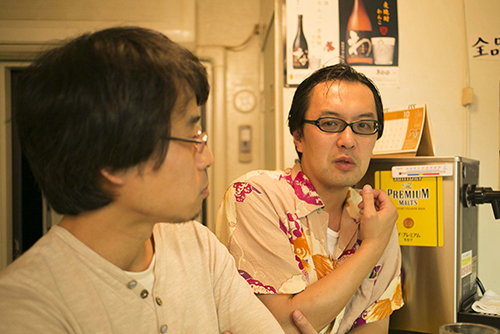
Otani: The "flâneur = solitary stroller" envisioned in "Les Passages" is a direct quotation from Rousseau, and I think that people who read Benjamin at the time were naturally reading him with Rousseau's writings in mind. It gives a very vivid idea of what would happen if Rousseau's stroller were to be set in 19th century Paris.
Benjamin and America
Otani: And Benjamin never went to America. There are limitations to how one can relate to American things in Europe, such as jazz music.
Fujiwara: Ah, so that's where jazz appears in the equinox.
Otani: Benjamin was in Europe from the 1920s to the 1940s and thought about American things. That's why I think there are limits to European thinking. Benjamin died without ever having had a say in what happened in America. He loved America so much, but he died without ever having been there. There's a disconnect there. Of course, if there had been any development after his exile, some kind of development may have occurred. (※)
*Benjamin is said to have committed suicide by taking poison while fleeing from the Nazis in the Pyrenees during World War II. He died in 1940.
So I think Benjamin was the last person to do a certain kind of work in Europe, and after Benjamin it was America. He himself was not able to go to America because of the time difference. So now that they are over, it's easy to say "flaneurs," but I try not to say that too much.
Fujiwara: Ah! I totally understand now.
I certainly hesitate to use the word "walk" lightly, and I think it's not good to feel some kind of self-satisfied intoxication. I've talked with Natsuki Ishigami, the playwright who is my teammate in this "Engeki Quest," and Masaki Ochi, the dramaturge, about not relying too much on the participants' own memories or introspection in the Honmoku edition.
By the way, this may not be related to the topic, but I have never been to America, and I don't have any desire to go there. I've been wondering why that is.
Otani: I don't know about that. It was just a coincidence. (laughs)
Fujiwara: No, it's not a coincidence. I don't really feel like going. The American Super Quiz is a thing of the past now...
Otani: No, but I don't want to go anywhere either, but if I'm told to go, I'll go.
Even though I don't want to go, I'll go to Colombia! (laughs)
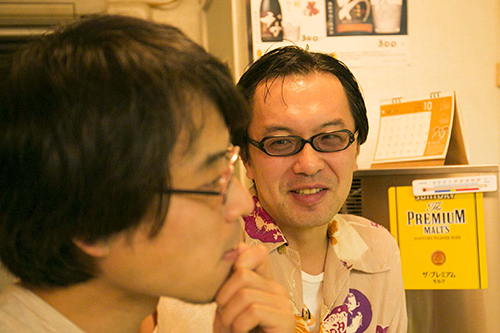
Fujiwara: Speaking of dreams of America, Kafka was one too.
Otani: People in Europe can't go outside. "I can't quit my job, I can't go on a trip" is what Kafka writes about.
Fujiwara: Maybe "Metamorphosis"? Personally, I think it's better to "get out" than to "not be able to get out", so I'm interested in Kafka's unfinished "The Castle". When I was walking around Honmoku for research, there was a moment when I thought, "Wow, this is definitely a "castle"... Well, I won't say too much about this because it would be a spoiler.
Walking and the Blues
Fujiwara: So, as part two of my series on throwing down the brush to Kobo, I would like to talk about "blues"... Rather than a strict musical definition, I would like to start by talking about songs that evoke a sense of melancholy.
For example, The Golden Cups has a song called "Honmoku Blues," and Aku Yu's "Honmoku Marchen" is also a song that really gets to me. "The girl who died in Honmoku became a seagull..." And Aoe Mina, who is famous for "Isezakicho Blues," also has a song called "Honmoku Blues," and the lyrics are amazing. "Who are you? This is Honmoku Blues..."
Mina Aoe "Honmoku Blues"
Otani: Well, I'll repeat myself, but the premise of "promenade" is the accumulation of capital in the city, or simply window shopping in Paris. So in "Passage Theory," it's important to think about what kind of era the 19th century was from a 20th century perspective. So, of course, America, which didn't exist in history until the first half of the 20th century, doesn't appear. And there's no way the blues will appear either.
So when someone says "Yuho and the Blues," I think there's no way they can be connected. In terms of classical music, it's like saying "Murasaki Shikibu and Kamo no Chomei." I feel the force of that saying, "Those two are completely different!"
Fujiwara: "The Tale of Genji and Hōjōki," you say!
Otani: I don't think there's any need to say "walk" either.
Fujiwara: Well, the reason why I am so obsessed with "flâneurs" is that, as I said before, "On Passages" assumes flâneurs to be different from tourists. I don't intend to worship what Benjamin wrote as a golden rule, but I am conscious that "Engeki Quest" is not tourism but flâneurs. Ultimately, it may be useful for tourism and town revitalization, and I don't intend to deny its usefulness.
What participants feel when they go out into the city in Engeki Quest is up to them, but the field of the stroll there is not just window shopping. Even in 19th century Paris, it was not only symbolized by wealth and goods, but also produced dark, lewd and shady parts. So I think the field of the stroll can be the city, the suburbs, the sea, the mountains, or the countryside. I just want you to free your senses and see and feel various things. There is no need to be concerned about your companions. Basically, I recommend walking alone. It may be partly inherited from Rousseau, the "lonely walker." I think that solitude is the last freedom allowed to humans.
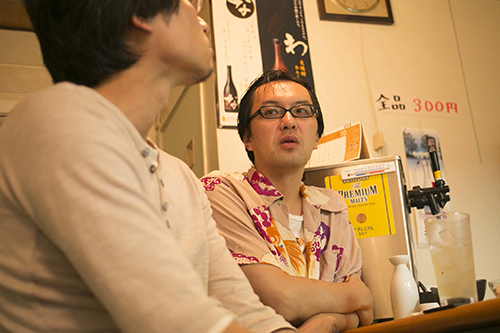
Master: I've finally managed to thaw the turban shells. For now, try eating them as is. They're full of flavor.
Fujiwara: Wow, I did it.
Otani: Ah, this would go well with sake.
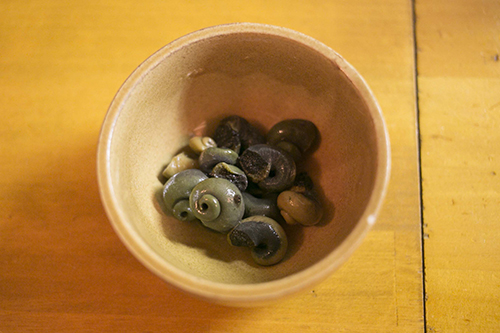
Otani: Isn't it dangerous to eat that much turban liver?
Master: Hahaha (laughs)
Fujiwara: The smell of the seashore is so nice.
Otani: (Turning to the master) We've just been talking about some pretty complicated stuff, but I'm starting to feel like it doesn't really matter anymore (laughs).
Fujiwara: I've been saying "Benjamin Benjamin" so much that it's starting to sound like some kind of spell... (laughs). I wonder if there are really that many people who say "Yuho" (walk)...
Otani: If you say that, no one has ever said that Charlie Parker's descending line was the 5th line, either... (laughs)
Fujiwara: Hehehe. By the way, I'd like to use this chat as a way to promote the Honmoku Art Project, but what is "Honmoku Nights" curated by you like?
Otani: Ah, I don't have much time left. I want to go home and check my emails quickly.
Fujiwara: Eh?! No, let's drink today.
Otani: No, no, I'm going home! (laughs)
Fujiwara: Let's drink a bit more.
Otani: Ah, Master, I'm going to do a live show at the old movie theater in Honmoku from November 22nd to 24th, so I'll bring the flyer next time. There will also be a Hamajiru dance with live performance lessons.
Fujiwara: There will be something different every night for the three days, with some impressive guests including Naruyoshi Kikuchi on the first night...You can even go from "Engeki Quest" to "Honmoku no Yoru"!
Bartender: Oh, before you leave, please give me your autograph. I'll put it up in the shop.
Otani/Fujiwara: Really?

Two people signing autographs
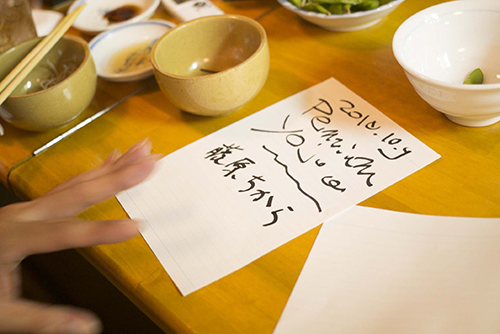
After being rejected by Otani, Fujiwara disappeared into a certain bar in Honmoku, but he was already disoriented and had no recollection of having even signed an autograph.
End
Here is the menu we had this time:
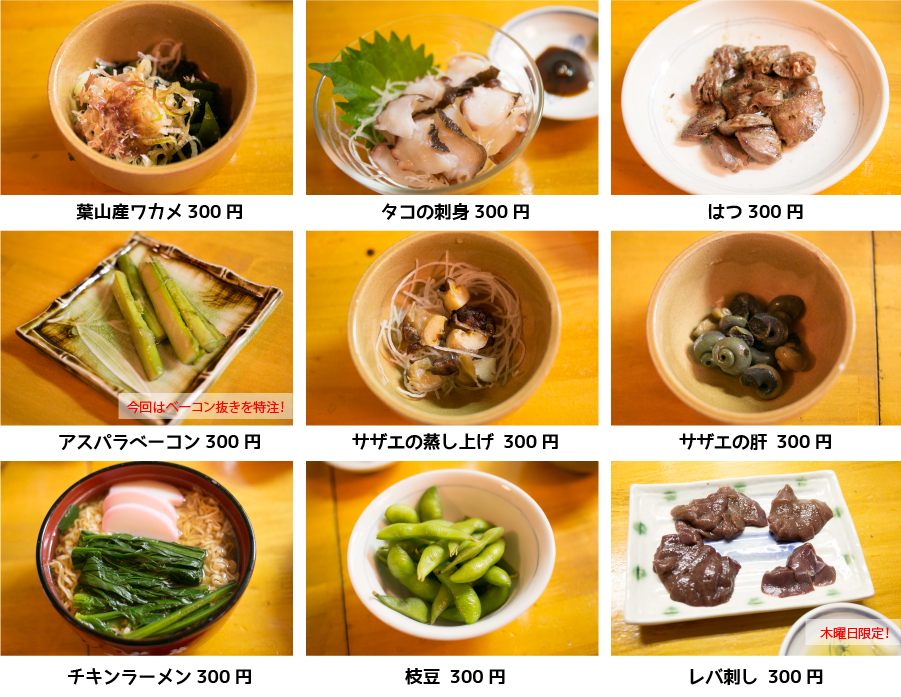
And today's recommendation is
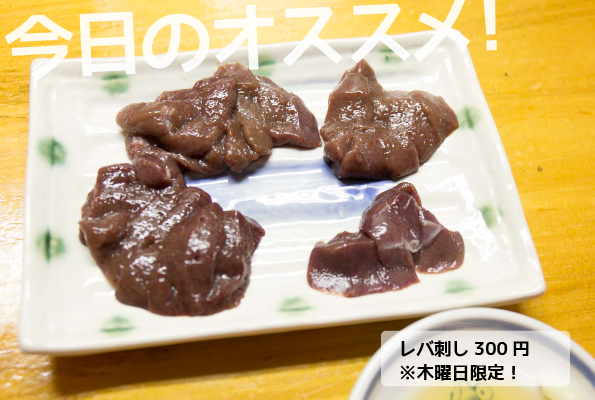
※Pork liver
This is also recommended, not just on Thursdays.
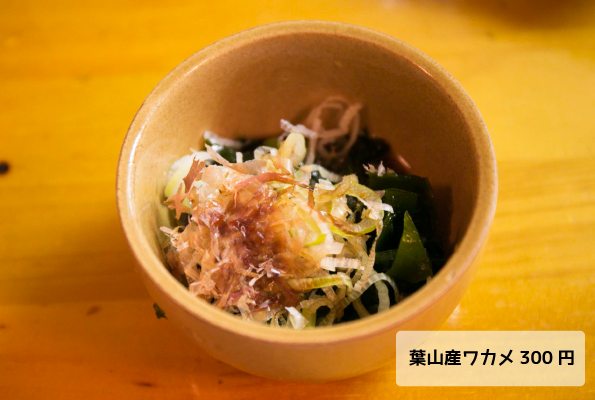
《Store Information》
First stop: Suzukiya Liquor Store
Yokohama City Naka Ward Honmokuhara 28-11
TEL: 045-622-8340
Business hours: 12:00-19:00
Closed: Irregular holidays
Access: 3 minutes walk from Honmokuhara bus stop on the Yokohama Municipal Bus
Second stop: Standing bar Yamashizu
Yokohama City Naka Ward Honmokucho 2-313-7 1F
TEL: 045-621-9855
Business hours: 17:00-24:00
Closed: Mondays
Access: 3 minutes walk from Kominato bus stop on the Yokohama Municipal Bus
